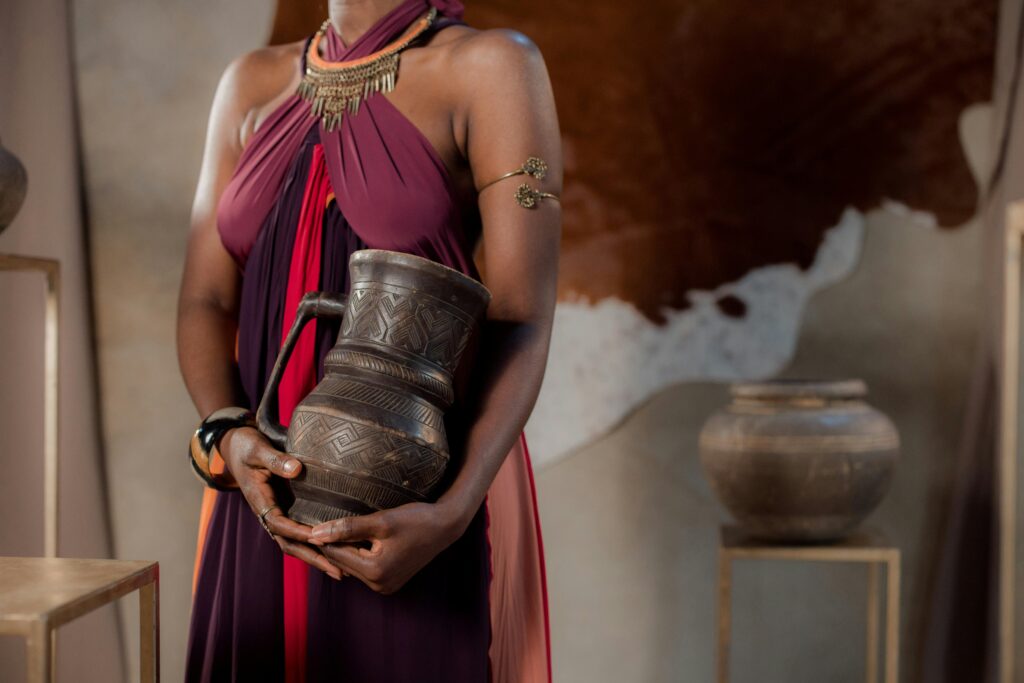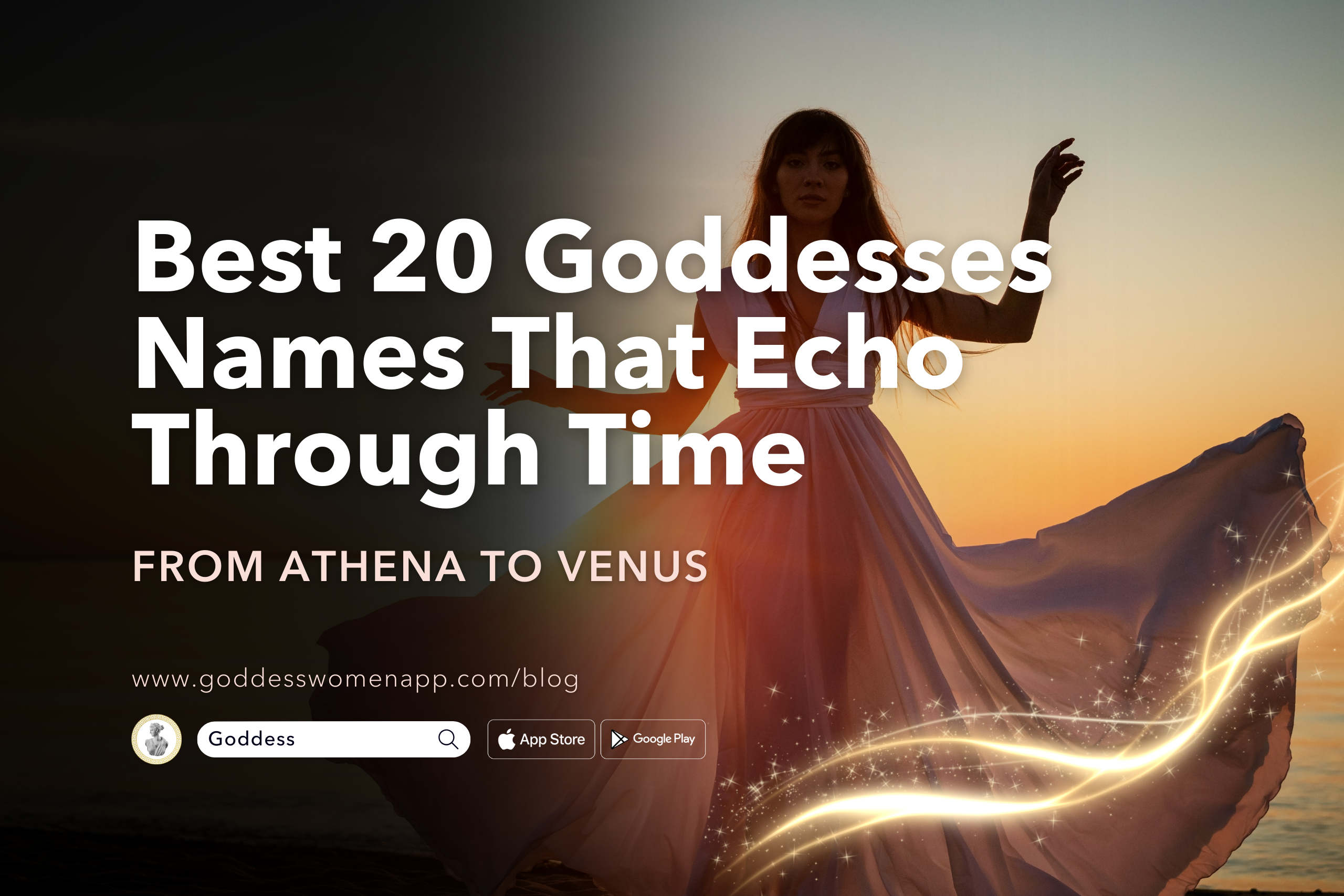Table of Contents
Introduction
The fascination with divine femininity spans across cultures, transcending time and geography. Ancient mythologies from Greece to Rome, and even extending to Hindu traditions, have celebrated the power and wisdom of goddesses, embedding goddesses names and stories into the fabric of human history. These deities, from the Greek goddess Athena to the Roman Venus, and the Hindu Saraswati, have not only shaped cultural narratives but also influenced personal identities and artistic expressions. This exploration delves into the enchanting realm of mythological names themselves, offering a glimpse into the divine femininity that continues to inspire and captivate.

The Enchanting Realm of Greek Goddesses Names
Athena – Wisdom and Warfare
Athena, the Greek goddess of wisdom and warfare, stands as a towering figure in Greek mythology. Known for her strategic skill in battle and her calm wisdom, Athena was revered across the ancient Greek world, her name synonymous with the city of Athens, a place of knowledge, democracy, and power.
Overview of Greek Goddess Athena
Greek goddess Athena’s birth, sprouting fully armed from the forehead of Zeus, the king of the Greek gods, symbolizes her role as a deity of intellect and war. Unlike other goddesses of war who personify raw energy and violence, Greek goddess Athena represents strategic warfare, embodying both intelligence and power.
Her Symbols and Significance in Greek Mythology
Greek Goddess Athena’s symbols, the owl, representing wisdom, and the olive tree, a symbol of peace and prosperity, reflect her dual nature as a goddess of both war and wisdom. Her involvement in epic poetry, such as Homer’s “Odyssey,” where she aids the hero Odysseus, showcases her role as a protector of heroes and a guide for those who seek knowledge and justice.
Greek goddess Athena’s virginity also ties her to the concept of eternal youth and purity, reinforcing her image as a paragon of virtue. As a goddess who never succumbs to the romantic pursuits of others, she maintains her independence, a trait that has inspired many cultures to view her as the epitome of strength and autonomy.
Exploring Greek Goddess Names and Their Legacy
Greek goddess Athena, alongside other revered Greek goddesses like Aphrodite, goddess of love and beauty; Artemis, goddess of the hunt and wild animals; and Demeter, goddess of the harvest, forms the cornerstone of the pantheon that influences modern perceptions of divine femininity. These ancient goddess names, echoing through epic poetry and sacred hymns, continue to resonate, reflecting their enduring impact on culture, art, and society.
Greek goddesses, with their rich narratives and complex characteristics, from the muses of lyric and epic poetry to the primordial goddess figures of creation, offer a vast tapestry of inspiration. Their stories, imbued with lessons of power, resilience, and wisdom, not only enrich our understanding of ancient civilizations but also provide timeless reflections on nature, humanity, and the divine.
As we delve deeper into the realms of Roman and Hindu deities, the universal themes of love, war, wisdom, and creation emerge, weaving a global narrative of goddesses whose names and stories transcend the boundaries of mythology, continuing to inspire awe and admiration in the hearts of those who recount them.

Aphrodite – Love and Beauty
Greek goddess Aphrodite, the Greek goddess of love and beauty, captivates with her enchanting allure, embodying the quintessence of grace, charm, and desirability. Born from the sea’s foam, according to myth, her entrance into the world was heralded by the sacred hymns of the sea nymphs, highlighting her connection to both the beauty of the natural world and its untamed, raw energy.
Her Role in Greek Tales and Her Impact
Greek goddess Aphrodite’s influence stretches far beyond the confines of Olympus, deeply ingraining herself in human affairs and the natural world. As a potent symbol of eternal youth and beauty, she inspires both gods and mortals, guiding their hearts with her invisible yet omnipresent force. Her stories in epic poetry and myths, often intertwined with the lives of other goddesses and heroes, reflect the complexities of love’s power, from the passionate to the perilous.
Aphrodite’s role extends to the arts, where lyric and pastoral poetry celebrate her virtues and vices, casting her as the muse behind countless works that explore love’s multifaceted nature. Her sacred symbols, the dove and the rose, serve as timeless emblems of love’s enduring beauty and potential for heartache.
Hera – Marriage and Queenship
Hera, the queen of the gods and the goddess of marriage and queenship, presides over the sacred bonds of matrimony and the stability of families. Her domain encompasses the aspects of fidelity, protection of married women, and the sanctity of the marriage vow. As a figure of immense authority and respect, Hera embodies the ideal of womanhood and the complexities of matrimonial harmony and discord.
Stories Highlighting Her Character and Powers
In Greek mythology, Hera’s character is often defined by her marriage to Zeus and her maternal role, protecting women in childbirth and presiding over the welfare of children. Despite the tumultuous aspects of her marriage, Hera’s steadfastness and commitment to her divine duties underscore her strength and the high esteem in which marriage was held in ancient Greek society.
Hera’s involvement in various mythologies, including her interactions with other goddesses and her decisive interventions in the tales of heroes, underscores her multifaceted nature. She is at once the protector and challenger, a deity who demands respect and adherence to the values she embodies.
The stories of Hera, like those of Aphrodite, are rich with themes of power, fidelity, and the divine feminine’s role in the ancient world. Together, these two minor goddess-es’ narratives offer a profound insight into the ancient Greeks’ values, fears, and aspirations, highlighting the goddesses’ names not just as mythological figures but as enduring symbols of human experience.
Artemis – The Hunt and Moon
Artemis, the ancient Greek goddess of the hunt, wild animals, and the moon, embodies the spirit of independence and the primal essence of nature. As a protector of the young and a guardian of the wild, her connection to the natural world is profound, symbolizing the raw energy and untamed beauty of the wilderness. Artemis’ vow of eternal youth and her role as one of the virgin goddesses further accentuate her independence, marking her as a symbol of freedom and protector of all that is wild and free.
Significant Myths Surrounding Artemis
The myths of Artemis are filled with stories of her might and compassion. One of the most significant tales involves her twin brother Apollo and their birth on the island of Delos, showcasing her immediate connection to the natural world and her prowess. Artemis is also known for her role in the tale of Actaeon, a hunter who saw her bathing and was transformed into a stag as punishment, highlighting her protective nature and the sacredness of her private moments.
As the goddess of the moon, Artemis represents the celestial beauty and mystery of the night sky. Her silver bow, from which she shoots her arrows of moonlight, is a symbol of her ability to illuminate the darkness and guide those who revere and respect the natural world.

Demeter – Agriculture and the Harvest
Demeter, the Greek goddess of agriculture, grain, and the harvest, is a central figure in Greek mythology, embodying the cycle of life and death, rebirth, and the nurturing aspect of the earth. Her dominion over the fertility of the earth made her an immensely important deity in the ancient Greek pantheon, her name synonymous with sustenance and the bounty of nature.
The Myth of Persephone and Its Lessons
The myth of Demeter and her daughter Persephone is one of the most poignant and significant tales within Greek mythology. It narrates the cycle of the seasons, the birth of agriculture, and the origins of the sacred rites of Eleusis. When Persephone is abducted by Hades and taken to the underworld, Demeter’s grief causes the earth to become barren, leading to the first winter.
This myth encapsulates themes of maternal love, loss, and the eventual return of mother earth to fertility and abundance with Persephone’s partial return to the earth. It serves as a sacred hymn to the power of motherhood, the depths of maternal love, and the cyclical nature of life and the seasons. Through Demeter’s sorrow and joy, the ancient Greeks understood the mysteries of life and death and the divine balance that sustains the world.
The stories of Artemis and Demeter, woven through with themes of independence, protection, and the nurturing force of the earth, highlight the diverse aspects of divine femininity and the integral role these goddesses played in the mythology and spirituality of ancient Greece. Their tales, rich in symbolism and meaning, continue to resonate, offering insights into the complexity of life and the enduring power of the goddesses’ names across many cultures.
Section 2: The Divine Influence of Roman Goddesses
Venus – Love and Desire
Venus, the Roman goddess of love, beauty, and desire, mirrors her Greek counterpart Aphrodite in many aspects. Both deities embody the quintessence of beauty and the complex nature of love, commanding the hearts of gods and mortals alike. Venus, however, integrates unique aspects of Roman culture and ideology, becoming a symbol of both romantic and patriotic love. Her name evokes the allure and the inherent desire for harmony and connection that defines human experience.
Roman Goddess Venus in Art and Culture
Roman goddess Venus’s influence on art and culture is monumental, inspiring countless works of art, from ancient sculptures and mosaics to Renaissance paintings that celebrate her beauty and the universal appeal of love. In Roman mythology, her role extends beyond the personal, symbolizing the unity and prosperity of the Roman state. Venus Genetrix, a title that emphasizes her aspect as the mother of the Roman people through her son Aeneas, highlights her significance in Roman society, linking divine love with the very foundation of Roman identity.
Minerva – Wisdom and Strategy
The Roman Equivalent of Athena
Roman goddess Minerva, the goddess of wisdom, strategy, and the arts, stands as the Roman equivalent of the Greek Athena. Revered in Roman mythology as part of the Capitoline Triad alongside Jupiter and Juno, Roman goddessMinerva’s domain encompasses more than just warfare; it includes wisdom, skills, and crafts. This broad scope reflects the Roman appreciation for the virtues of intellect and creativity, positioning Roman goddess Minerva as a patroness of both scholars and artisans.
How Minerva Influenced Roman Society
Roman goddess Minerva’s influence permeated Roman society, guiding its values and aspirations. Her temples were centers of intellectual and spiritual life, places where Romans sought divine inspiration and guidance. The festival of Minerva, the Quinquatria, celebrated her patronage of arts and crafts, highlighting her role in fostering the development of skills and knowledge. As a symbol of strategic warfare, Minerva also embodied the Roman ideals of strength combined with wisdom, advocating for a balanced approach to conflict that prioritized intelligence over brute force.
Roman goddess Minerva’s enduring legacy in Roman culture is a testament to the importance of wisdom and skill in navigating the complexities of life. Like her Greek counterpart Athena, Roman goddess Minerva remains a symbol of the pursuit of knowledge and the strategic application of intellect, embodying the timeless virtues of wisdom and courage. Through the stories and worship of these powerful goddesses, ancient societies articulated their deepest values and aspirations, leaving a legacy that continues to inspire to this day.
Juno – Protector of Women and the State
Juno’s Significance in Roman Mythology and Festivals
Juno, the queen of the gods, embodies the Roman ideals of femininity, marriage, and childbirth, playing a pivotal role as the protector of women and the state. Her significance in Roman mythology is underscored by her relationship with Jupiter, the king of the gods, with whom she shares the guardianship of the Roman people. Juno’s festivals, such as the Matronalia, celebrate her as the guardian of women, particularly married women and mothers, reinforcing her status as a divine protector and advocate for women’s welfare within the Roman family and society.
Her Relationship with Jupiter
Roman goddess Juno and Jupiter’s relationship, while complex, showcases the balance of power and the dynamic between the masculine and feminine divine forces in Roman religion. Juno’s assertiveness and independence, combined with her role as a wife and mother, reflect the multifaceted nature of her divinity, embodying the strength and dignity of Roman women. Her interactions with Jupiter, often marked by her intelligence and wit, highlight her importance not just as a consort but as a powerful deity in her own right, essential to the stability and prosperity of the state.
Diana – Hunt, Moon, and Nature
Diana’s Role and Her Overlap with Artemis
Diana, the Roman goddess of the hunt, the moon, and nature, parallels the Greek Artemis in her domain and attributes. Revered by the Romans for her independence, strength, and connection to the natural world, Diana is celebrated as a protector of women and children and a patroness of hunters. Her virginity and autonomy are central to her identity, representing purity, self-sufficiency, and the untamed aspects of nature.
Iconic Myths Featuring Diana
One of the most iconic myths involving Diana is the story of Actaeon, a hunter who, like in the tale of Artemis, accidentally witnesses the goddess bathing and is transformed into a stag as a punishment, only to be torn apart by his own hounds. This myth emphasizes the sacredness of the goddess’s privacy and her fierce protection of her sanctity and autonomy. Diana’s myths capture her dual nature as both nurturing and formidable, embodying the raw, untamed power of the natural world.
Ceres – Agriculture, Fertility, and Motherly Relationships
The Roman Version of Demeter
Ceres, the Roman goddess of agriculture, fertility, and motherly relationships, mirrors the Greek Demeter in her roles and significance. As the giver of agricultural bounty and the guardian of the earth’s fertility, Ceres is deeply revered in Roman religion, embodying the vital connection between human society and the nurturing powers of nature. Her cult and rituals underscore the dependency of civilization on the earth’s cycles and the divine.
Ceres in Roman Religion and Her Importance
Ceres’ importance in Roman religion is evident in the festival of Cerealia, which celebrates the goddess of fertility and her blessings on the harvest and fertility of the land. Her myths, particularly the story of her daughter Proserpina (the Roman counterpart to Persephone), highlight themes of loss, the cyclical nature of life, and the deep bond between mother and child. This myth explains the seasons and articulates the Roman understanding of life, death, and rebirth, reflecting the eternal cycle of nature’s renewal. Ceres, like Demeter, represents the unbreakable bond between mother and child, emphasizing the maternal aspect of the divine and its integral role in the sustenance and continuity of life.
Through the stories and worship of Juno, Diana, and Ceres, Roman mythology celebrates the diversity and complexity of the goddesses’ roles, offering insights into the Roman world’s spiritual and societal values. These deities, with their distinct domains and narratives, collectively illustrate the Romans’ reverence for the feminine divine and its essential contributions to both the natural world and human society.

Unveiling the Divine Femininity in Hindu Mythology
Hindu Goddess Saraswati – Knowledge and Arts
Saraswati’s Significance in Hindu Culture
Hindu goddess Saraswati, the Hindu goddess of knowledge, music, arts, and wisdom, stands as a beacon of enlightenment and creativity. Revered across many cultures within Hinduism, she symbolizes the sacred river of consciousness that nourishes the mind and spirit. Saraswati’s significance transcends mere academic wisdom; she embodies the essence of discovery and the pure joy of learning, making her an essential figure in the pantheon of Hindu goddess names. Her veneration speaks to the value placed on education, intellect, and artistic expression in Hindu culture.
Festivals and Worship Practices
The festival of Vasant Panchami is dedicated to Hindu goddess Saraswati, marking the arrival of spring and celebrated with great fervor across Hindu communities. Devotees dress in yellow, symbolizing the mustard fields of spring, and offer prayers, music, and poetry to honor the goddess. Educational institutions conduct special ceremonies to invoke her blessings, underlining her central role in the pursuit of knowledge and the arts. Saraswati Puja is a testament to the goddess’s enduring presence in the lives of those who seek wisdom and creativity.
Lakshmi – Wealth and Purity
The Importance of Lakshmi in Hinduism
Lakshmi, the goddess of wealth, fortune, and purity, is a central figure in Hindu mythology. Her presence is synonymous with prosperity, not just in material terms but also in the spiritual wealth of virtues and ethical living. Lakshmi’s symbolism as the provider of abundance and success makes her one of the most invoked deities in Hindu prayers and rituals. Her role extends beyond the confines of economic prosperity to include the realms of beauty, harmony, and the well-being of all creation.
Celebrations in Her Honor
Diwali, the festival of lights, is among the most significant celebrations dedicated to Lakshmi, illuminating her as a beacon of hope, wealth, and new beginnings. Homes and temples are decorated with lights and rangolis, inviting her into their spaces to bless them with prosperity and happiness. The rituals include the lighting of lamps, offerings of sweets, and prayers, symbolizing the removal of spiritual darkness and the ushering in of a brighter future.

Parvati – Love, Fertility, and Devotion
Parvati’s Role in Hindu Mythology
Parvati, the goddess of love, fertility, and devotion, represents the universal mother figure and the embodiment of strength and love. As the consort of Shiva, the destroyer in the Hindu trinity, Parvati plays a crucial role in Hindu mythology, symbolizing the nurturing aspect of the divine feminine. Her stories are tales of unwavering devotion and the power of love to transform and transcend. Parvati’s manifestations, including Kali and Durga, reveal her multifaceted nature, from gentle nurturer to fierce protector.
Her Forms and Stories
Parvati’s tales are rich with symbolism and lessons on love, sacrifice, and the strength of the feminine spirit. The story of her penance to win Shiva’s affection and their subsequent marriage is a testament to her determination and the depth of her love. As Durga, she is the invincible warrior and goddess of war who combats evils, and as Kali, she embodies the fierce power of destruction and renewal. These diverse aspects highlight the dynamic expressions of femininity and the profound respect for the goddess’s power in Hindu culture.
The reverence for Saraswati, Lakshmi, and Parvati in Hindu mythology underscores the integral role of the goddesses in shaping cultural and spiritual narratives. Through their stories and worship, these deities inspire devotion, impart wisdom, and offer insights into the complexities of life, embodying the timeless essence of divine femininity that resonates across many cultures and ages.
The Legacy of Roman Goddesses
The pantheon of Roman goddesses, with their vivid narratives and powerful domains, significantly shaped Roman culture, leaving an indelible mark that extends far into contemporary society. From Venus’s embodiment of love and beauty to Minerva’s wisdom, and from Ceres’s nurturing fertility to Juno’s sovereign majesty, each goddess contributed to the rich tapestry of Roman religious life and societal values. These divine figures were not mere subjects of worship; they were integral to the Roman understanding of the natural world, human psychology, and the complexities of existence.
How Roman Goddesses Shaped Roman Culture and Beyond
Roman goddesses played a pivotal role in daily life, influencing everything from legal systems and social structures to arts and literature. Their festivals and rites reinforced community bonds and reflected the Romans’ aspirations and fears. Moreover, the goddesses’ attributes and stories offered models of behavior and identity for Roman citizens, guiding them in their personal and collective lives.
The Enduring Legacy of Roman Mythology in Contemporary Society
The influence of Roman goddesses extends beyond the ancient world into modern times, their names and stories permeating contemporary culture, language, and thought. The concepts of justice, wisdom, beauty, and power, as personified by these deities, continue to inspire literature, art, psychology, and popular media. Legal systems and philosophical concepts also bear the imprint of Roman religious and ethical insights, demonstrating the timeless relevance of these ancient narratives.
Comparative Analysis of Roman and Greek Goddesses
While Roman goddesses often share their attributes and myths with their Greek counterparts, distinct differences highlight the unique Roman context. Venus, unlike Aphrodite, encompasses a broader spectrum of love, including the love for one’s country. Minerva, more so than Athena, is associated with the arts and crafts, reflecting the Roman esteem for practical wisdom and innovation. These distinctions underscore the adaptability of myth to reflect the values and priorities of different societies.
Conclusion
Our journey through the lives of goddesses from Greek, Roman, and Hindu mythologies unveils a world where the divine feminine shapes destinies, inspires greatness, and imparts wisdom. These goddesses, with their complex narratives and powerful legacies, continue to influence our modern world, offering insights into the human condition and the natural world. Their stories, rich in drama and significance, remind us of the enduring power of mythology to reflect and shape human culture across ages and civilizations.
The names and tales of these divine figures transcend mere mythology, becoming symbols of strength, wisdom, beauty, and resilience that resonate across cultures. As we reflect on the fascinating journey through the lives of these goddesses, we recognize their indelible impact on our collective imagination and cultural heritage. Their legacy, woven into the fabric of history and contemporary life, continues to inspire and guide humanity, reminding us of the profound influence of the divine feminine on our understanding of the world.





